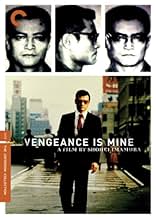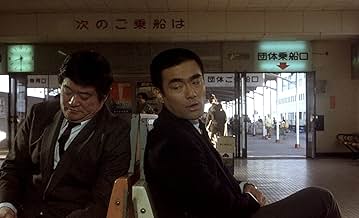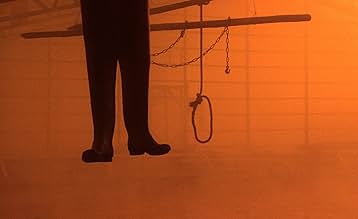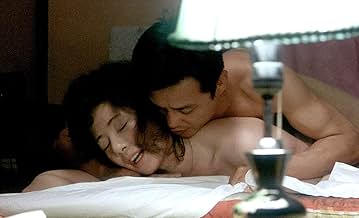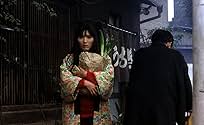AVALIAÇÃO DA IMDb
7,7/10
7,7 mil
SUA AVALIAÇÃO
Adicionar um enredo no seu idiomaChronological exploits of Iwao Enokizu, a murderous thief on the run.Chronological exploits of Iwao Enokizu, a murderous thief on the run.Chronological exploits of Iwao Enokizu, a murderous thief on the run.
- Direção
- Roteiristas
- Artistas
- Prêmios
- 21 vitórias e 6 indicações no total
- Direção
- Roteiristas
- Elenco e equipe completos
- Produção, bilheteria e muito mais no IMDbPro
Avaliações em destaque
Far from a film that explores the "whydunit?" of a ruthless but charming murderer, Vengeance of Mine bristles with all the energies Imamura believes the real Japanese possess. These people are in lower social positions and just trying to survive the brutality of day-to-day struggles. In their energy, courage, and perseverance to survive, Vengeance of Mine becomes beautiful and captivating to watch.
Admittedly, it is quite difficult to understand such stereotypes as murderer, tempted Catholic, prostitute, pimp/hotel owners, and delivery men as eccentric individuals in the space of two hours. But oddly enough, I feel a strange sense of familiarity in the hustle and bustle of these characters in the story. They may live their lives teetering on what is considered socially acceptable or healthful, but Imamura presents them with such respect and curiosity (of an anthropologist?!) - that I cannot resist feeling their robust lives leaping off the screen. In this way their seemingly bizzare and extreme behavior are very convincing, very real, and very touching.
Highly recommended for the challenging story (flashbacks, vignettes, illogical twists and turns of story and visual), quirky pace, idyllic country scenes, and the wonderful performance of Ken Ogata.
Admittedly, it is quite difficult to understand such stereotypes as murderer, tempted Catholic, prostitute, pimp/hotel owners, and delivery men as eccentric individuals in the space of two hours. But oddly enough, I feel a strange sense of familiarity in the hustle and bustle of these characters in the story. They may live their lives teetering on what is considered socially acceptable or healthful, but Imamura presents them with such respect and curiosity (of an anthropologist?!) - that I cannot resist feeling their robust lives leaping off the screen. In this way their seemingly bizzare and extreme behavior are very convincing, very real, and very touching.
Highly recommended for the challenging story (flashbacks, vignettes, illogical twists and turns of story and visual), quirky pace, idyllic country scenes, and the wonderful performance of Ken Ogata.
This dark masterpiece pushes to the limits of my toleration for violence and sex. We get to watch the "how", "when", "where" of the story of the murderous sociopath (brilliantly portrayed by Ken Ogata) but are denied any convincing "why" by Imamura. This film seemed to have echoes of Poe -- another master at combining humor with the horrific and macabre. When it comes to cinema, though, there is no other master anything like Imamura.
No aspect of this film (acting, cinematography, script) is less than impressive. A recent 2 DVD set from Panorama (a Hong Kong company) provides English subtitles and is technically adequate (albeit far from superlative).
No aspect of this film (acting, cinematography, script) is less than impressive. A recent 2 DVD set from Panorama (a Hong Kong company) provides English subtitles and is technically adequate (albeit far from superlative).
I think this movie is an all around tour-de-force depiction of a sociopath. All aspects of this movie are superb. The main actor gives a truly chilling and convincing portrayal of a man with no conscience, at the same time giving his character great depth and complexity. Aside from being based on true events, this cold blooded murderer is much more realistic than the clever game-playing types portrayed in such films as "Silence of the Lambs". I would highly recommend this movie to all but the squeamish.
'Vengeance Is Mine' is one of the best movies I've watched in a long time. I know there is a growing cult surrounding Imamura ('The Pornographers'), but I'm still extremely surprised that this movie isn't better known and discussed more. For many movie fans Japanese cinema either equals Kurosawa and Ozu if you're highbrow, and Godzilla and Mothra if you aren't, but both these simplistic approaches marginalize all kinds of fascinating and exciting movies from Suzuki's 'Tokyo Drifter' and 'Branded To Kill' in the 1960s, 'Vengeance Is Mine' and Oshima's 'In The Realm Of The Senses' in the 1970s, on to such contemporary innovators as Shinya Tsukamoto ('Tetsuo'), Beat Takeshi ('Hana-bi'), Takashi Ishii ('Gonin'), and Takashi Miike ('Ichi The Killer'). 'Vengeance Is Mine' is easily the most interesting serial killer movie I've ever seen. The narrative structure can be a bit confusing at first, and that combined with Imamura's non-judgmental approach might throw some viewers for a while, but if you persevere you won't regret it. Ken Ogata gives an impressive performance and the movie as a whole is utterly brilliant. I watched it twice to try and fully appreciate it, and I would now rate it as one of the very best movies of the 1970s (my favourite movie decade). This beautiful and disturbing movie comes with my highest recommendation!
Vengeance Is Mine marked Shôhei Imamura's return to fiction filmmaking after a decade spent working on documentaries. It is based on the true case of Nishiguchi, a Japanese criminal who eluded police for 78 days while committing five murders. The novel from which the screenplay was taken changed the name of the anti-hero to Iwao Enokizu and fictionalized real events. By providing a 'halfway house' between complete invention and real crime reporting, the source thus gave Imamura an ideal stepping-stone back into feature films: retaining the support of documentary inspiration whilst allowing the director to bring his personal vision and structuring to the events unfolding on screen.
Modern viewers are long used to a diet of slaughterer cinema, whether it be the Eileen Wuornos depicted in Monster, Albert Fish of The Grey Man, or much less illustrious fodder as Bundy, and Ed Gein. But even after 25 years, Vengeance Is Mine remains one of the few outstanding mass-murderer screen biographies. Told through a series of flashbacks, Imamura's film suggests by its structure both the disassociations of a killer's mind as well as reducing any empathy between creator and lead figure.
Thus we see Enokizu's story in five different time periods or points of view: first, during his final arrest and in police custody; then during the police investigation itself; while the killer is committing his crimes and escaping from the law; fourthly, his life before his crimes. Finally there's a scene or two occurring after the execution.
By recounting the various stages in a killer's life in non-linear fashion, interesting juxtapositions are possible, all the while dramatic tension between crimes is disrupted. We know that the murderer will have his way and the opening shows us he has been caught. The script's treatment of the material means suspense is removed from events, instead placed at a psychological level, i.e. not on how Enokizu builds to a killing and, presumably, hopes to get away with it, but why he does.
But as critic Alex Cox has said: "there are no easy answers" found in a movie much more oblique in its presentation than Hollywood might attempt. Indeed, for the most part, Enokizu's crimes seem to have no overwhelming motive at all (apart from the need for survival money), although deep at the heart of his compulsive behaviour is his bitter relationship with his father. And as Cox further observes, although Vengeance Is Mine headlines a biblical source, ("vengeance is mine, I shall repay sayeth the Lord") it is not absolutely clear in the film on who, or what, Enoziku is wreaking vengeance on.
If providence is interested in exacting justice by turn, bringing a necessary come-uppance, its mainly represented by two or three shots over the course of a film, suggestive of a hangman's noose - much more man's law than heavenly retribution. This, while Enokizu is caught and punished, such critical moments (commonplace set pieces in such western killer-centered films such as In Cold Blood) are not even shown. Vengeance Is Mine leaves precise moments of apprehension and execution to our imagination. Instead it shifts focus onto a fractured criminal career of mayhem, familial confusion, and casual sex.
Enoziku's father, Shizuo, is a complicated figure who stands as much at the centre of the narrative as does his son. Shamed during the war by refusing to stand up to the requisitioning authorities (a traumatic event witnessed by his son) he later develops a close relationship with Enokizu's wife. Although we presume not consummated, this attraction is a continuing source of great friction. But as Shizuo admits, another tie binds them as: "the blood of the devil runs in my blood too." At the end of the film it is left to Shizuo, a Catholic, to feel the guilt his son never expresses, and undergo excommunication as he arranges to be buried away from his wife in final penance. Critics have argued that Enoziku's murderous career is ultimately inspired by a lack of ability to kill his own father, and this failure is what motivates in turn his rage against others. Shizuo certainly recognises this weakness in murder during a final confrontation between the two, and it represents Enoziku's only regret.
With many of its characters drawn from the working classes and a preoccupation with sex, Vengeance Is Mine is a film entirely characteristic of its director, even after a decade long hiatus in his feature career. Like Mizoguichi before him, he often concerned himself with fallen or distressed women in his movies and here they are, represented once again. Imamura had also been a black marketeer in his early years, and was quite at home depicting the underbelly of society, whether it be the sleazy family inn at which Enoziku finds himself, the casual nature of the call-girls brought to its door or the fact that grandmother (herself a killer) watches intimate proceedings through a peep-hole.
Enoziku adapts the identity of a university professor during his stay at the inn, and elsewhere a lawyer (filching thereby an amount of money saved for a parole payment). Both outwardly upstanding and hunted at the same time, the criminal hides his culpability beneath a respectable façade. As with the rest of the film, the director's distancing allows no judgement on this state of affairs, merely showing Enoziku's illusion as convincing. Instead it leaves the anti-hero and his actions in a limbo, dependent on our own moral standpoint. Like the murderer's bones, thrown into the sky at the close, matters are suspended between heaven and hell, requiring further investigation.
Modern viewers are long used to a diet of slaughterer cinema, whether it be the Eileen Wuornos depicted in Monster, Albert Fish of The Grey Man, or much less illustrious fodder as Bundy, and Ed Gein. But even after 25 years, Vengeance Is Mine remains one of the few outstanding mass-murderer screen biographies. Told through a series of flashbacks, Imamura's film suggests by its structure both the disassociations of a killer's mind as well as reducing any empathy between creator and lead figure.
Thus we see Enokizu's story in five different time periods or points of view: first, during his final arrest and in police custody; then during the police investigation itself; while the killer is committing his crimes and escaping from the law; fourthly, his life before his crimes. Finally there's a scene or two occurring after the execution.
By recounting the various stages in a killer's life in non-linear fashion, interesting juxtapositions are possible, all the while dramatic tension between crimes is disrupted. We know that the murderer will have his way and the opening shows us he has been caught. The script's treatment of the material means suspense is removed from events, instead placed at a psychological level, i.e. not on how Enokizu builds to a killing and, presumably, hopes to get away with it, but why he does.
But as critic Alex Cox has said: "there are no easy answers" found in a movie much more oblique in its presentation than Hollywood might attempt. Indeed, for the most part, Enokizu's crimes seem to have no overwhelming motive at all (apart from the need for survival money), although deep at the heart of his compulsive behaviour is his bitter relationship with his father. And as Cox further observes, although Vengeance Is Mine headlines a biblical source, ("vengeance is mine, I shall repay sayeth the Lord") it is not absolutely clear in the film on who, or what, Enoziku is wreaking vengeance on.
If providence is interested in exacting justice by turn, bringing a necessary come-uppance, its mainly represented by two or three shots over the course of a film, suggestive of a hangman's noose - much more man's law than heavenly retribution. This, while Enokizu is caught and punished, such critical moments (commonplace set pieces in such western killer-centered films such as In Cold Blood) are not even shown. Vengeance Is Mine leaves precise moments of apprehension and execution to our imagination. Instead it shifts focus onto a fractured criminal career of mayhem, familial confusion, and casual sex.
Enoziku's father, Shizuo, is a complicated figure who stands as much at the centre of the narrative as does his son. Shamed during the war by refusing to stand up to the requisitioning authorities (a traumatic event witnessed by his son) he later develops a close relationship with Enokizu's wife. Although we presume not consummated, this attraction is a continuing source of great friction. But as Shizuo admits, another tie binds them as: "the blood of the devil runs in my blood too." At the end of the film it is left to Shizuo, a Catholic, to feel the guilt his son never expresses, and undergo excommunication as he arranges to be buried away from his wife in final penance. Critics have argued that Enoziku's murderous career is ultimately inspired by a lack of ability to kill his own father, and this failure is what motivates in turn his rage against others. Shizuo certainly recognises this weakness in murder during a final confrontation between the two, and it represents Enoziku's only regret.
With many of its characters drawn from the working classes and a preoccupation with sex, Vengeance Is Mine is a film entirely characteristic of its director, even after a decade long hiatus in his feature career. Like Mizoguichi before him, he often concerned himself with fallen or distressed women in his movies and here they are, represented once again. Imamura had also been a black marketeer in his early years, and was quite at home depicting the underbelly of society, whether it be the sleazy family inn at which Enoziku finds himself, the casual nature of the call-girls brought to its door or the fact that grandmother (herself a killer) watches intimate proceedings through a peep-hole.
Enoziku adapts the identity of a university professor during his stay at the inn, and elsewhere a lawyer (filching thereby an amount of money saved for a parole payment). Both outwardly upstanding and hunted at the same time, the criminal hides his culpability beneath a respectable façade. As with the rest of the film, the director's distancing allows no judgement on this state of affairs, merely showing Enoziku's illusion as convincing. Instead it leaves the anti-hero and his actions in a limbo, dependent on our own moral standpoint. Like the murderer's bones, thrown into the sky at the close, matters are suspended between heaven and hell, requiring further investigation.
Você sabia?
- CuriosidadesBased on true story of serial killer Akira Nishiguchi.
- Erros de gravaçãoFlashback scene taking place in 1946 features an American flag containing 50 stars on the back of a US Army Jeep. The US flag in 1946 featured only 48 stars in even rows and columns of six.
- Citações
Shizuo Enokizu: You can only kill those who never harmed you.
- ConexõesFeatures Libertação 3 - A Direção do Ataque Principal (1971)
Principais escolhas
Faça login para avaliar e ver a lista de recomendações personalizadas
- How long is Vengeance Is Mine?Fornecido pela Alexa
Detalhes
- Data de lançamento
- País de origem
- Central de atendimento oficial
- Idiomas
- Também conhecido como
- Vengeance Is Mine
- Locações de filme
- Kannawa Hot Spring, Beppu, Oita, Japão(Murder Scene)
- Empresas de produção
- Consulte mais créditos da empresa na IMDbPro
Bilheteria
- Faturamento bruto nos EUA e Canadá
- US$ 11.891
- Faturamento bruto mundial
- US$ 21.452
Contribua para esta página
Sugerir uma alteração ou adicionar conteúdo ausente



